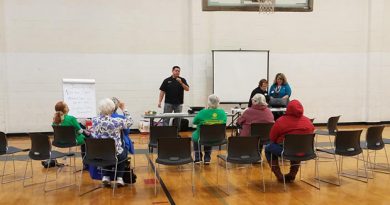Common Myths About Meditation
Meditation can benefit your mind by allowing feel good chemicals to be released in your brain which in turn allows your body to relax, as well as bringing a more solid connection with your Higher Power. Many claim they enjoy the benefits of meditation, often multiple times throughout their day. Others report struggle with an over active mind and inability to be still. It could be they have not been introduced to the many varieties of meditation. I would like to share with you some myths about meditation.
1. There is only one way to meditate.
There are many ways to meditate. Open Focused Awareness Meditation where the focus is directed toward an object, like breathing or a mantra. Walking Meditation where the focus is synchronizing the body, breath, and mind to the present moment, and experiencing a profound sense of connection with yourself and nature. (Pelechowicz, 2019)
2. You must empty your mind to meditate.
Most think the goal of meditation is to “empty your mind.” This is not accurate. Those attempting to empty their minds are often dissatisfied because our minds are rarely at rest. Everyone has thoughts during meditation, and most thoughts are completely unrelated to your meditation: acknowledge them and allow them to pass, rather than trying to suppress or push them away. Your mind may be very active, constantly shuffling thoughts in and out. Your job is to simply allow those thoughts to come and go and focus on relaxing your body. (Pelechowicz, 2019)
3. To meditate, you have to sit for hours at a time.
Meditation does not have to consume too much time. Maybe ten minutes a day is best for your schedule. You can use something as simple as breathing exercises, which can be as short as three to five minutes. However, you do need to make a commitment. It’s generally more beneficial to practice regularly for a short amounts of time than to practice for a longer times sporadically. (Pelechowicz, 2019)
4. Quick results.
Meditation isn’t easy. It takes time to become acquainted with it and to reap the benefits of practice. Making progress requires practice and patience. Think of it as something you are building. Taking the time to build a solid foundation by focusing on the basics ensures that you become well-established before moving on to the next step. (Pelechowicz, 2019)
5. Meditation is a religious practice.
Meditation may sound uncomfortably religious to some. Talk about spirituality and self-realization can be intimidating and may even turn one off from meditation. While meditation can be spiritual, you don’t have to be religious or spiritually focused to practice it. The practice of meditation simply comprises different methods for reconnecting you to your innermost self. (Pelechowicz, 2019)
Meditation does not have to be a mystery to you and one can use mindful-type meditations in almost any aspect of their lives simply by using all of their senses while completing a task. This works from eating, to walking, to brushing your teeth. Using all of your senses keeps you in the present as well, which is where we do our best growing.
–Michelle Clearwater, BA, LAC
References: Pelechowicz, S. (2019). Yoga International. Retrieved from Yoga International: https://yogainternational.com/article/view/5-myths-about-meditation
Valeo Behavioral Health Care: 785-233-1730
Crisis Services: 400 SW Oakley, Topeka, KS 66606
24 Hour Crisis Line: 785-234-3300
National Suicide Prevention Life Line: 1-800-273-8255
Shawnee County Suicide Prevention Coalition: SCSPC.org
Family Service and Guidance Center (18 and under), 325 SW Frazier, Topeka, KS 66606
24 Hour Crisis Number: 785-232-5005
Healing after Loss to Suicide Group (HeALS): Sandy Reams – Group Facilitator; Topeka.Heals@gmail.com; 785-249-3792
READ: The Disease Concept of Addiction and Mental Health Disorders
Go here to visit the Topeka Health and Wellness Facebook page for local event notices, news and local announcements. To help us spread the word, and to continue seeing our posts on your Facebook feed, “Like” the page and then like or share a story now and then, so that they will keep showing up in your feed.






Pingback: 4 Ways to Use Potatoes - Topeka Health and Wellness
Pingback: Health & Wellness Information at the Library - Topeka Health and Wellness
Pingback: Four Resolutions That Will Benefit Your Mental Health - Topeka Health and Wellness
Pingback: The hottest fitness trends for 2020 - Topeka Health and Wellness